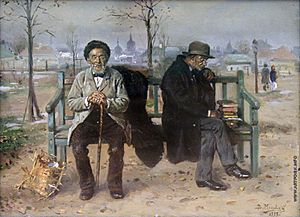Pessimism facts for kids
Pessimism is a way of thinking where someone usually expects bad things to happen. A pessimist believes that things are generally not good, and that the world might be the worst it could possibly be. They often focus on the negative side of situations.
For example, if you see a glass with water up to the middle, a pessimist would say it's "half empty." An optimist, on the other hand, would say it's "half full." Pessimism is the opposite of optimism.
Contents
What is Pessimism?
Pessimism is an attitude or a mindset. It means having a negative outlook on life and expecting the worst outcome in most situations. People who are pessimistic often feel that their efforts won't succeed, or that problems are too big to solve. This way of thinking can affect how they feel, what they do, and how they interact with others.
How Pessimism Shows Up
Pessimism can appear in different ways. Sometimes, it's a general feeling that things will go wrong. Other times, it's a specific belief about a certain event, like thinking you will fail a test even if you studied hard. People might become pessimistic because of past bad experiences, or because they see a lot of problems in the world around them.
Is Pessimism Always Bad?
While often seen as negative, pessimism isn't always a bad thing. Sometimes, a little bit of pessimism can be helpful. It can make people more careful and prepared for challenges. For example, a pessimistic person might plan for possible problems, which can help them avoid mistakes. However, too much pessimism can lead to feelings of sadness, hopelessness, or a lack of motivation.
Famous Ideas About Pessimism
Throughout history, many thinkers have explored the idea of pessimism. Some philosophers believed that human life naturally involves suffering and disappointment.
Arthur Schopenhauer's View
One famous philosopher, Arthur Schopenhauer, was known for his pessimistic views. He believed that life is mostly suffering and that happiness is just a temporary break from pain. He thought that people are driven by desires that can never be fully satisfied, leading to constant unhappiness.
Albert Camus and the Absurd
Another thinker, Albert Camus, explored ideas related to pessimism, though he didn't call himself a pessimist. He wrote about the "absurd," which is the idea that humans search for meaning in a world that has no clear meaning. He used the story of Sisyphus, a character from Greek mythology who was punished to roll a boulder up a hill forever, only for it to roll back down. Camus used this story to show that even in a meaningless world, people can find happiness by accepting their fate and rebelling against it.
Related pages
Images for kids
-
Camus used the punishment of Sisyphus to represent the human condition.
See also
 In Spanish: Pesimismo para niños
In Spanish: Pesimismo para niños
 | Aurelia Browder |
 | Nannie Helen Burroughs |
 | Michelle Alexander |





